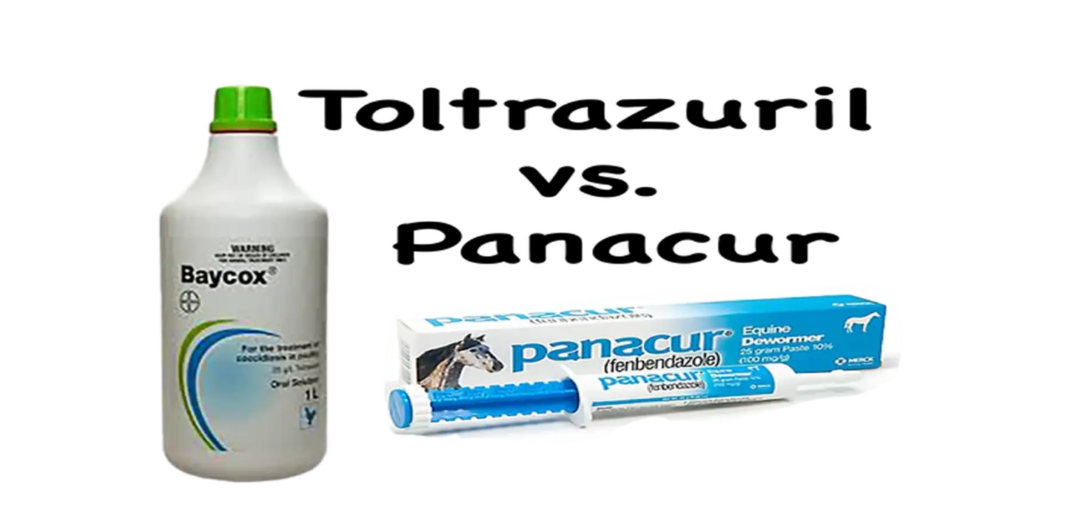When it comes to de-worming your rabbits, you may encounter various treatment options. Two common choices are Panacur and Toltrazuril, both of which are effective in addressing parasitic infestations in rabbits. In this article, we’ll compare these de-worming treatments to help you make an informed decision.
The Importance of Selecting the Right De-worming Treatment
Selecting the appropriate de-worming treatment for rabbits is a critical aspect of their care. Here’s why it’s so important:
1. Specific Parasites: Rabbits can harbor various intestinal parasites like pinworms, roundworms, and tapeworms. Identifying the exact parasite is vital because each requires a different treatment.
2. Health Risks: Untreated parasites can lead to serious health issues in rabbits, including weight loss, poor coat quality, diarrhea, and potentially fatal conditions. Effective de-worming eradicates these risks.
3. Rabbit-Safe Medications: Rabbits have delicate digestive systems, making it important to use de-wormers that are specifically formulated for them to avoid adverse reactions.
4. Age and Health Considerations: The appropriate de-worming protocol may vary depending on the rabbit’s age, health status, and whether the rabbit is pregnant. This makes personalized treatment plans crucial.
5. Avoiding Resistance: Misuse of de-wormers can contribute to drug resistance among parasites, making future treatments less effective. Responsible medication use is therefore essential.
6. Expert Guidance: Consulting with a veterinarian is the best way to ensure correct diagnosis and treatment. They can advise on the most effective and safe de-worming medications for your rabbit.
7. Prevention is Key: Good hygiene and regular cleaning of living spaces are just as important as medication in preventing parasite infestations.
8. Monitoring Effectiveness: After de-worming, it’s important to monitor your rabbit and possibly schedule a follow-up with the vet to ensure the treatment was successful and discuss how to prevent future issues.
Selecting the right de-worming treatment is about more than just addressing current infestations—it’s about maintaining the long-term health and well-being of your rabbit through careful, informed, and strategic care.
Panacur: A Well-Known De-wormer
Panacur, the commercial name for fenbendazole, is an anthelmintic medication that is extensively utilized for de-worming in a variety of animals, including rabbits. It is a trusted name in the realm of parasitic control due to its broad-spectrum efficacy. Here are some points that expound upon its significance and use:
1. Broad-Spectrum Effect: Fenbendazole is effective against a wide range of gastrointestinal parasites, which includes many of the common worms that afflict rabbits, such as pinworms and roundworms.
2. Safety Profile: Panacur is known for its safety and can be administered to rabbits of various ages and breeds with a low risk of side effects when used as directed. It is also deemed safe for pregnant does, which is an important consideration in breeding situations.
3. Versatility: It comes in various forms, such as granules, oral suspensions, and paste, making it easy to administer depending on the preference of the pet owner and the disposition of the rabbit.
4. Dosage and Administration: The correct dosage of Panacur is crucial and should be determined by a veterinarian based on the weight of the rabbit and the severity of the infestation. Treatment typically spans several days to ensure that all stages of the parasites are eradicated.
5. Mode of Action: Fenbendazole works by disrupting the metabolic pathways of the parasites, effectively starving them and causing them to die off. It is absorbed in the gut, attacks the parasites, and is excreted with minimal absorption into the host’s system.
6. Resistance Concerns: While fenbendazole has been a reliable dewormer, there is always the concern of parasites developing resistance. Therefore, it should be used judiciously and typically under the guidance of a veterinarian.
7. Post-treatment: After completing a course of Panacur, it is generally recommended to have a follow-up fecal examination to ensure the parasites have been fully eliminated.
8. Preventative Use: In some cases, veterinarians may recommend using Panacur as a preventive measure, especially in high-risk environments or as part of a herd health program.
Panacur’s reputation as an effective dewormer for rabbits is well-earned, given its efficacy against a variety of parasites, ease of use, and strong safety profile. However, it’s essential to use such medications responsibly and in consultation with a veterinarian to ensure the best outcomes for rabbit health and welfare.
Toltrazuril: A Proven Alternative
Toltrazuril is another highly effective deworming option, especially in the treatment of coccidiosis, a common and potentially devastating disease caused by Eimeria parasites. It primarily affects the digestive system of rabbits.
Comparing Panacur and Toltrazuril
When considering Panacur (fenbendazole) and Toltrazuril for deworming rabbits, it’s important to recognize their distinct properties and how they target different parasitic issues. Here’s a detailed comparison:
Efficacy Against Different Parasites:
– Panacur is a broad-spectrum anthelmintic, which means it can kill a wide variety of worms including pinworms, roundworms, and some tapeworms. It disrupts the energy metabolism of the worms.
– Toltrazuril, on the other hand, is highly effective against protozoan parasites, specifically Eimeria spp., which cause coccidiosis in rabbits. It acts by interfering with the division of the protozoa.
Safety Profiles:
– Both drugs are considered safe for rabbits when dosed properly.
– Panacur is often praised for its high margin of safety and minimal side effects.
– Toltrazuril also has a good safety record, but as with any medication, there’s a risk of side effects if the drug is not used as directed.
Ease of Administration:
– Panacur can be easier to administer since it’s available in granules that can be mixed with food, paste, or liquid form.
– Toltrazuril is typically given as an oral suspension and may require careful dosing and ensuring that the rabbit ingests the full dose, which can sometimes be challenging if the rabbit is averse to the taste or is stressed by the administration process.
Specific Parasitic Infestations:
– The choice between Panacur and Toltrazuril should be based on the specific parasitic infestation affecting your rabbit. If a rabbit is suffering from coccidiosis, Toltrazuril is the preferred treatment due to its targeted action against coccidia.
– For a broader range of helminthic parasites, Panacur would be the go-to due to its wider spectrum of action.
Veterinary Guidance:
– A vet can provide a definitive diagnosis of the type of parasitic infection and recommend the appropriate treatment.
– They may also recommend combining treatments or alternating them in cases of mixed infestations or to prevent resistance.
Treatment Course and Follow-up:
– The duration and course of treatment with Panacur or Toltrazuril can vary. It’s important to complete the full course as prescribed to ensure all stages of the parasite are eradicated.
– Follow-up with fecal exams after treatment is important to verify the elimination of the parasites.
In summary, while both Panacur and Toltrazuril have their place in rabbit health care, the choice between them should be informed by the type of infestation, the rabbit’s health status, and veterinary recommendations. Proper diagnosis and treatment planning are key to successful de-worming and maintaining the health of rabbits.
Consult with Your Veterinarian
The best choice between Panacur and Toltrazuril depends on your rabbits’ individual needs and the specific type of parasitic infection. Consult with your veterinarian to determine the most suitable de-worming method, and follow their guidance for dosing and treatment duration.
Conclusion
Both Panacur and Toltrazuril are effective de-worming treatments for rabbits, but the choice should be made based on your rabbits’ unique requirements and the type of parasitic infection they are facing. Always prioritize the health and well-being of your rabbits in your de-worming decisions and consult with your veterinarian for expert guidance. If you’re in need of a dependable source of Toltrazuril for your rabbits, consider visiting ToltrazurilShop.com




